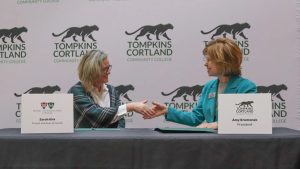ITHACA, N.Y. — The National Science Foundation (NSF) has selected Cornell University as a $1 million awardee and finalist for investment through its regional innovation engines program.
Cornell’s effort seeks to “grow the region into America’s next hub for climate research and innovation,” the office of U.S. Senate Majority Leader Charles Schumer (D–N.Y.) announced Thursday.
Cornell University will receive a $1 million award to develop its proposal to grow a “climate smart bioeconomy” in the upstate New York region. The university can now compete in the next phase for up to a $160 million in federal investment to bring Ithaca’s work to tackle climate change “to the next level.”
(Sponsored)

Avoid the Employment Law Mistakes that Threaten Your New Business
Amid the excitement and uncertainty that accompany the opening of a new business, entrepreneurs often overlook basic employment law requirements that can cost them dearly. These include how they classify

The OBBBA Resurrects the Immediate R&E Expense Deduction
Under the Tax Cuts and Jobs Act (TCJA), businesses, including manufacturers, have been required since 2022 to amortize domestic Section 174 research and experimental (R&E) costs over five years, rather
“This NSF Regional Innovation Engines development award presents a tremendously exciting new opportunity for Cornell to help map a more prosperous and sustainable future for New York, and for our planet,” Cornell University President Martha Pollack said. “Cornell University is grateful for Senator Schumer’s leadership to fuel national investment in new approaches like this NSF Engines program and the NSF Directorate for Technology, Innovation, and Partnerships (TIP) — programs that leverage our regional and national capacity for advanced research as a springboard for sustainable economic growth. I look forward to the collaborative innovation of our teams at Cornell and SUNY ESF [in Syracuse], and the way they will bring theory to practice as we work to address our most urgent global challenges.”




